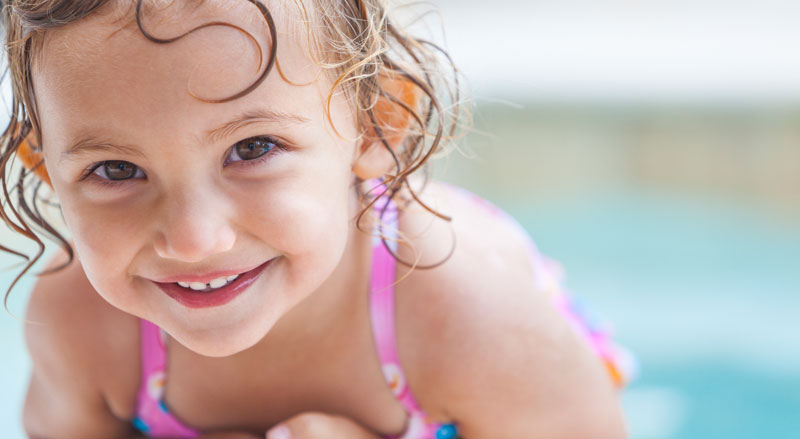This summer promises to be fun. You’re planning lots of trips to the pool now that your toddler is out of their delicate infant stage. It may seem early but it’s not—it’s time to think about swimming lessons for toddlers.
The CDC provides insights into toddler’s behavior. Toddlers love to be active. They want to move around, explore their environment, and copy adult actions. Toddlers are curious about and ready to enjoy the water.
One to two years of age is the perfect time for kids to start swim lessons. It’s never too early to start developing abilities that will help kids learn to swim when they’re older.
Swim Lessons for Toddlers Are Important
Learning to swim isn’t just learning about a new sport. Swimming is a life skill that will enhance a person’s life forever.
Knowing how to swim can help prevent drowning. It also enables a person to help keep others safe around water.
The American Academy of Pediatrics (AAP) has recently changed its position, and now believes that swim and water survival skills training will add an extra layer of protection against drowning starting from age one.
Unfortunately, accidental drowning is the second most common cause of death for toddlers, so taking all possible safety measures is critical.
When parents and kids are in the water together, swim teachers can talk about water safety. The more parents know about keeping their child safe around water, the safer their child will be and less likely to accidentally drown.
Always remember that no amount of knowledge about drowning prevention can override these critical safety factors:
- Never leave a child unsupervised near or around water
- A life jacket or other flotation device is never a substitute for being within arm’s distance of your toddler/child when they are in the water.
Is Your Toddler Ready for Swim Lessons?
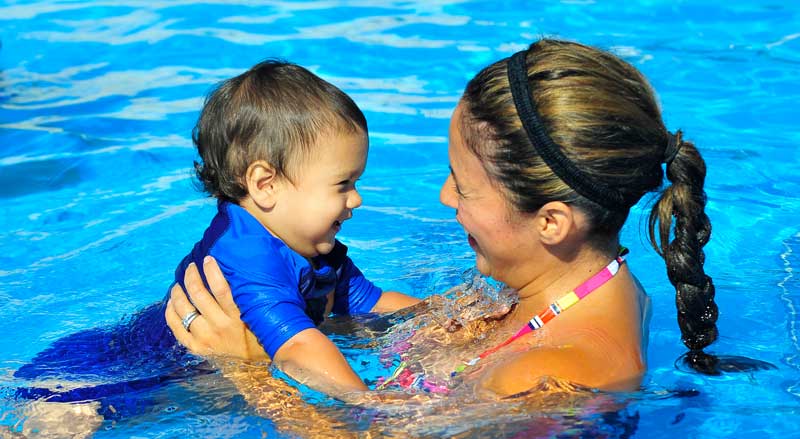
Children develop at different rates. One young toddler may be up and walking everywhere, while another toddler still enjoys crawling as their main mode of getting around.
Your child’s readiness for swim lessons depends on several factors including:
- Emotional maturity
- Physical abilities
- Comfort in the water
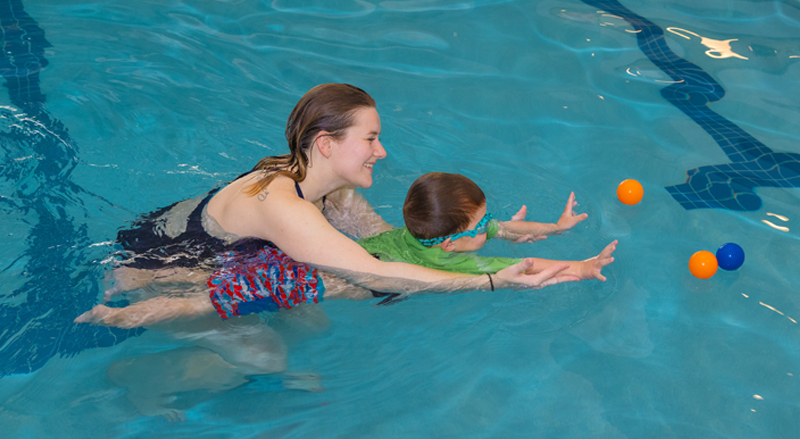
If your toddler is displaying the following signs, they are likely ready for swimming lessons:
- They like to blow bubbles in the water
- They can float if supported by an adult
- They can get their face wet in the pool without swallowing water
- They like to splash in the water
Toddler swim classes help toddlers become comfortable in the water. They’ll begin to develop skills that will enhance their swimming ability later.
In toddler classes, toddlers and older students are usually independent of their parents in the water. But the teacher should always be within touch.
Toddler and pre-school swimming lessons at Njswim focus on breath control, supported floating, and safe ways to enter and leave the pool.
These classes help a toddler:
- Gain confidence in the water and in their growing water skills
- Have fun in the water
- Start to develop future water skills—such as kicking and holding their breath
Think About a Water Babies Class
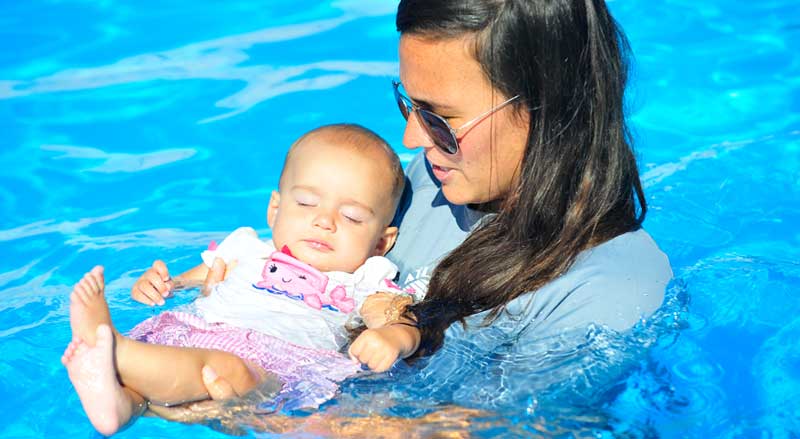
Younger toddlers may be more comfortable in a Water Babies class. At Njswim, we have classes for babies aged 3-30 months.
These classes are a fun way to help your child become comfortable in the water as they start to develop:
- Breath control
- Balance
- Buoyancy
- Movement
Water Babies classes benefit a young child’s cognitive, physical, and social development, and are a fun bonding time for babies and their parents.
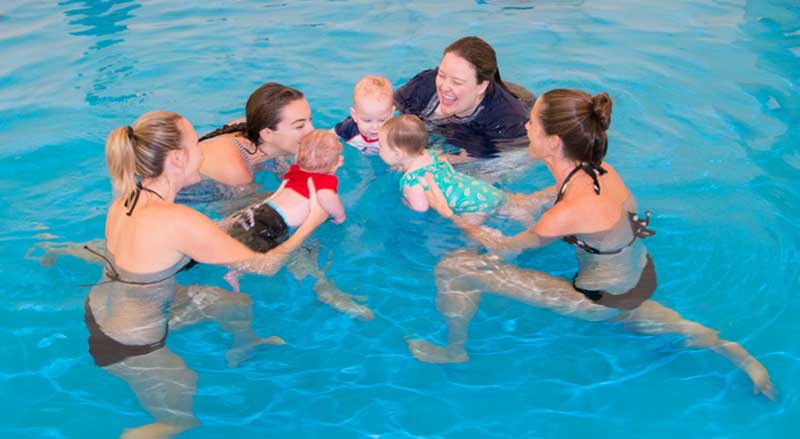
Read more about why to enroll your child in a Water Babies class.
Here’s a guide to enrolling your child in the right level swim class.
What to Look for in a Swim School
Highly Qualified Swim Teachers
Teachers need to be experienced and certified in CPR and first aid, but they also need to love working with children.
Toddlers can be fearful or unsure when they are first in the water. A well-trained, experienced, and caring swim teacher knows how to help the child relax in the water so that they can have fun as they learn at their own pace.
Our Njswim teachers are highly qualified to teach swimming. They are trained as lifeguards, trained in child development, and love what they do!
Lifeguards Present at All Times
A swim school must always be prepared for the unexpected. It’s important that a lifeguard, with CPR and First Aid training, is always on duty.
Safe and Comfortable Conditions
Swim schools should keep pool water at proper chlorinated levels. Children will accidentally swallow water, so it’s critical that this water is safe.
Hypothermia is a greater risk for younger toddlers and water babies. Pool water should be kept between 87° Fahrenheit and 94°Farenheit.
A swimming school should have comfortable changing facilities for all students, parents, and pool guests.
Parents should have access to a comfortable viewing area from which they can watch their kid’s lessons. Kids love knowing they can show off their new skills during lessons.
Focus on Teaching Water Safety
Water safety should always be part of swim lessons.
Two important water safety rules taught to toddlers should include:
- Never swim without adult supervision
- Never enter the water without first asking for permission from your parent, caregiver, lifeguard, or swim teacher
Keep Swim Classes Small
Simply being in the water can be an overwhelming experience for a toddler. At Njswim, we limit class size to only three, so that each toddler will feel safe, seen, and valued in their swim class.
Contact Njswim today for information about year-round swim lessons for your child in our comfortable, heated pools. Our six New Jersey swim school locations are clean, safe, full of amenities, and welcoming to all.

